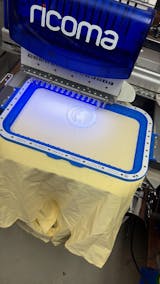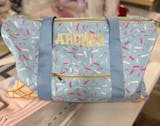1. Introduction to Feiyue Embroidery Technology
Feiyue has been a trailblazer in embroidery, serving commercial and home users with machines built for performance and ease. The lineup balances innovation and friendly controls, with models spanning the high-speed FY1201TC, the versatile FY777, and the beginner-friendly FYe350. Whether you need an embroidery sewing machine for household projects or a unit for production runs, Feiyue focuses on robust design and practical features.
Feiyue strengthens its market position by integrating brushless AC servo motors that can deliver up to 35% energy savings. The emphasis on sustainability pairs with broad material support, so you can stitch delicate pieces and heavy-duty jobs with confidence.
Table of Contents
- 1. Introduction to Feiyue Embroidery Technology
- 2. Technical Specifications & Performance Breakdown
- 3. Model Comparison: Choosing Your Feiyue Machine
- 4. Mastering Feiyue Machine Operations
- 5. Energy Efficiency & Innovation Validation
- 6. Real-World Stress Test Results
- 7. Advanced Customization Strategies
- 8. Conclusion: Optimizing Your Embroidery Workflow
- 9. FAQ: Feiyue Machine Essentials
2. Technical Specifications & Performance Breakdown
2.1 Speed & Stitch Capabilities
Engineered for speed and precision, the FY1201TC reaches 1,000 stitches per minute (SPM) and includes automatic thread trimming plus real-time touchscreen controls to streamline work. In comparison, the Toyota AD860 reaches 1,200 SPM with standard frames but matches 1,000 SPM on cap frames, underscoring Feiyue’s competitive performance.
2.2 Embroidery Area & Material Handling
The FY1201TC supports a large 22×14 inches field, enabling small cap designs through to oversized garments. A 270° wide-angle cap system improves results on curved surfaces. Stability is further enhanced by using magnetic embroidery hoops to reduce fabric slippage and improve stitch quality at speed.
3. Model Comparison: Choosing Your Feiyue Machine
3.1 Commercial vs Household Models
The FY1201TC is a 12-needle commercial workhorse for high-volume production. It brings a 22×14 inch sewing field, IoT integration, and industrial-grade capability at a price of $8,895. For advanced home users, the FY777 combines sewing and embroidery functions, a large LCD touchscreen, and an extra-large embroidery frame that expands project possibilities.
3.2 Specialized Features for Different Users
For beginners, the FYe350’s servo motor and portability make it approachable and easy to learn—an excellent embroidery machine for beginners. By contrast, the FY1201TC offers industrial durability for demanding shops. Sewtalent compatibility also helps scale garment production as needs grow.
4. Mastering Feiyue Machine Operations
Operating a Feiyue efficiently comes down to clean threading, correct bobbin setup, and consistent maintenance. Doing these well preserves stitch quality and extends machine life.
4.1 Threading & Bobbin Setup Guide
Threading the Machine
- Upper Thread Setup: Raise the presser foot to release tension. Thread from right to left through the take-up lever, then down through the lower guide. Seat the thread by pulling it up and away from the machine.
- Bobbin Thread Pull-Up: Place the bobbin in its case, raise the needle to the top with the handwheel, pull up the bobbin thread through the needle plate to form a loop, and tuck both threads under the presser foot.
Bobbin Winding
- Preparation: Place the spool on the pin and cap if needed. Route the thread through the tension disk and thread guide for even winding.
- Winding Process: Mount an empty bobbin on the winder, hold the thread end, engage the winder, and let it fill. Cut the thread and install the bobbin with correct tension feed.
Tension Adjustment Tips
Adjust the tension dial for fabric and thread type. Balanced tension interlocks upper and lower threads in the fabric’s middle, avoiding puckers and loose stitches.
4.2 Maintenance for Long-Term Reliability
Cleaning Protocols
- Shuttle Race: Remove the cover, brush out lint and debris, and reassemble carefully.
- Feed Dogs: Remove the needle plate, brush teeth to clear dust, and restore parts to position.
Lubrication Schedules
Apply quality sewing oil to moving parts such as gears and the shuttle race after cleaning to minimize friction and wear.
Needle Replacement
Replace needles regularly to protect fabric and maintain stitch quality. Loosen the clamp screw, remove the old needle, and insert a new one with the flat side facing away.
Using sewtalent magnetic hoops can reduce slippage, stabilize garments, and cut down on rework from misalignment.
5. Energy Efficiency & Innovation Validation
Feiyue’s brushless servo motors change the efficiency equation, with up to 35% energy savings over traditional motors.
Energy Savings and Motor Efficiency
In models such as the FYe380, brushless servo motors improve efficiency by 10% versus single-phase induction motors. They maintain high torque at ultra-low speeds, making thick fabrics like denim manageable without sacrificing control. An integrated metal frame further supports stitch consistency and durability.
| Feature | Detail |
|---|---|
| Motor Type | Brushless servo motor with 100W power output |
| Efficiency | 10% higher than traditional motors |
| Power Savings | 35% average reduction in energy consumption |
| Sewing Capabilities | Handles delicate silk to heavy-duty jeans |
Innovation and Competitor Comparison
Patented drive systems, including those in the FY777, focus on stitch quality. Comparable, competitor-specific energy data remains limited in the information available.
Sustainability Implications
The 35% power savings supports broader sustainability goals by cutting consumption. Data on carbon footprint or lifecycle comparisons to competitors is not provided.
6. Real-World Stress Test Results
Thick Material Handling
The FYe350 sews through 10 layers of raw denim smoothly thanks to servo motor control, then transitions to delicate silk organza while preserving stitch quality. For added stability under load, magnetic hoops for embroidery machines support secure clamping and help prevent hoop burn.
Long-Term Reliability
For small business workflows, the FYe350’s reliability is reinforced by:
- Magnetic Hoops: Designed for Feiyue machines, these hoops endure 500,000 cycles of repeated use, securing fabric and minimizing hoop marks.
- 7-Teeth Feed Dog System: Improves fabric control and accuracy, cutting slippage over long runs.
Key Features Enhancing Durability
| Feature | Specification/Detail |
|---|---|
| Motor Technology | Servo motor for high torque and stability |
| Feed System | 7-teeth feed dog for precise fabric control |
| Stitch Options | 23 stitch types for versatility |
| Accessories | Magnetic hoops (500,000+ cycles durability) |
The FYe350’s ability to move from extreme thickness to delicate layers without mechanical changes highlights its adaptability. Broader multi-user field testing would add further validation.
7. Advanced Customization Strategies
Feiyue offers robust hardware, yet some users seek smoother customization and software workflows. Industry-standard tools and practices can help fill documentation gaps.
Design Software Compatibility
While Feiyue does not publish explicit compatibility details, industry norms apply. Most modern machines (e.g., Brother and Happy) support USB transfers. Verify USB availability and test third-party software such as Hatch Embroidery; Wilcom’s EmbroideryConnect enables WiFi-based transfers, though Feiyue users may rely on USB or adapters.
Custom Pattern Creation
Use tools like Hatch to resize, recolor, and adjust stitch types. Export to software such as PE Design or Wilcom for edits, then transfer via USB. For complex appliqué or multi-step designs, following workflow tutorials from similar machines can inform sequencing and format conversion.
Firmware Updates
A common approach mirrors other systems:
- Download updates from the manufacturer website.
- Extract to USB and insert into the machine.
- Use the settings menu to apply the update.
Updates may add settings such as Embroidery Area Margin or 2-Step Frame Return to improve positioning.
Key Gaps and Recommendations
| Aspect | Industry Standard | Feiyue-Specific Gap | Recommendation |
|---|---|---|---|
| Software Compatibility | Documented support (e.g., Hatch, Wilcom) | No public documentation | Trial third-party software (e.g., Hatch’s 30-day trial) |
| Custom Design Tools | Advanced editing in dedicated apps | Limited guidance | Use cross-platform tools (e.g., PE Design) |
| Firmware Updates | Detailed procedures available | No published process | Contact Feiyue support or check manufacturer portals |
In short, cross-platform tools and general best practices can unlock more value while Feiyue expands its documentation.
8. Conclusion: Optimizing Your Embroidery Workflow
Feiyue’s range covers speed, embroidery area, and durability across commercial and home contexts. Define your needs, choose the right model, follow threading and maintenance fundamentals, and apply practical customization workflows. With diligent care and smart accessories, you can elevate consistency and throughput while benefiting from energy-efficient drive systems.
9. FAQ: Feiyue Machine Essentials
9.1 Q: What is the maximum fabric thickness that Feiyue machines can handle?
A: Machines such as the FYe350 can sew through 10-layer denim thanks to servo motor power and robust construction.
9.2 Q: What kind of warranty coverage do Feiyue machines offer?
A: Warranty coverage typically includes parts and labor for a specified period, often one year. Check with the retailer or manufacturer for exact terms.
9.3 Q: Are Feiyue machines beginner-friendly?
A: Yes. Models like the FYe350 are beginner-friendly, offering automatic threading, varied stitch patterns, and a user-friendly interface.



